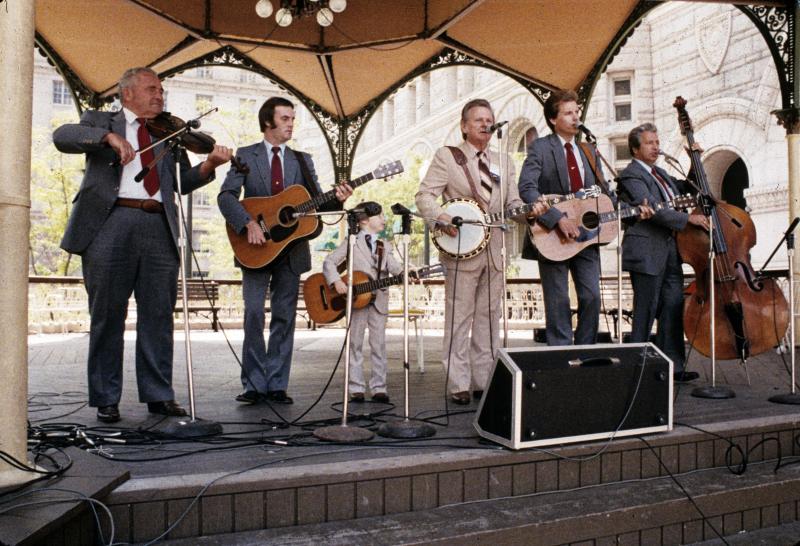1982

NEA National Heritage Fellow Ralph Stanley (center with banjo) leads his band in a concert outside the Old Post Office Building in Washington, DC, in 1984. NEA file photo
Over the previous decades, efforts had been made to better honor some of the precious cultural traditions and art forms that had helped form American life. In particular, jazz—a musical art form created in the United States that often reflected American life and was used diplomatically to spread American values worldwide, and the folk arts—taking the traditions of immigrant cultures and melding them into our own, to expand the cultural palette of the country.
In 1982, plans were finalized to create new lifetime honors awards in these two fields: the NEA National Heritage Fellowships and the American Jazz Masters Fellowships (later changed to NEA Jazz Masters Fellowships). These would be awards that were based on nominations from the public, not applications. And the criteria were simple: awardees must be living, be citizens or permanent residents of the U.S., and demonstrate a significant contribution to the art form.
The first class for both awards certainly demonstrated that last criterion. In jazz, awards went to Roy Eldridge, one of the first virtuoso musicians after Louis Armstrong; Dizzy Gillespie, one of the pioneers of bebop and a significant composer, arranger, and bandleader (as well as a fiery trumpeter); and Sun Ra, a bandleader and composer who was able to play traditional and avant-garde jazz with equal quality and led a cadre of brilliant musicians, many who continue to perform.
In the folk arts, among the 15 awards were Dewey Balfa, renowned Louisianan Cajun fiddler; Bessie Jones, a singer from the Georgia sea islands; Brownie McGhee and Sonny Terry, an acoustic blues duo that had been playing since the 1940s; George López, a carver of saint images, called santos, that are common throughout Latin America and in parts of the U.S., such as New Mexico, and Bill Monroe, the father of bluegrass music.
In the 2000s, an advocate award was added to both honors programs. These were to be awarded to those who helped preserve, promote, and forward the art forms and traditions. The Heritage award was named after Bess Lomax Hawes, a former NEA director of Folk and Traditional Arts who helped create the awards and was a fierce advocate for the folk arts, and the Jazz Masters award was named after A.B. Spellman, whose work at the NEA and in his own writing helped to promote jazz.

